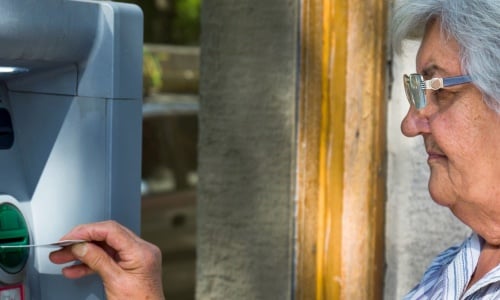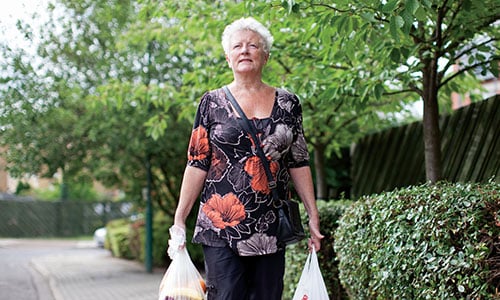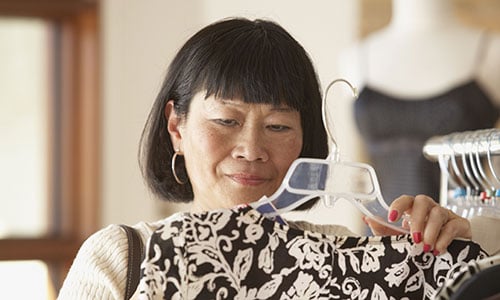The last year has brought massive changes to our daily lives, from how we shop to the ways we socialise, and we’ve all had to adapt. This has been particularly true for older people trying to access their money through payment and banking services. So what support are banks offering, and how might this still be needed post-lockdown?
The impact of COVID-19
All of us have been forced to spend much longer at home during the pandemic, with older and clinically vulnerable people asked to shield for months at a time. Suddenly, paying for everyday expenses like groceries, bills and carers became challenging for those who couldn’t leave the house.
Alongside this, hundreds of bank branches shut their doors or reduced their opening hours or services. This restricted access for those who need or want to manage their money in person, or need a new loan, mortgage, or credit card. Reduced access to face-to-face banking is part of a long-running trend that has seen a third of UK bank branches shut since 2015. This has been paired with the loss of thousands of cash machines, reduced by 24% between 2017-2020. These factors have combined to limit options for the millions of older people and other citizens who don’t have the skills, confidence or equipment to bank online.
Older people who struggle to leave home, are not online, and forced to rely on others to manage their money is not a new issue. Age UK previously explored the problem and potential solutions as part of a 2016 report on Age Friendly Banking. Those living with health conditions, disabilities or have issues with mental capacity often face challenges in managing their money. Other factors such as a lack of public or private transport, social isolation, and language difficulties can also force people to become reliant on others or simply go without.
Relying on others
Older people and disabled people have often had to rely on others when managing their income, savings and expenditure. This means handing over cards, PIN numbers and online banking information. Trusted third parties like a partner, family member, friend, or someone in the community are a lifeline for many. There are also millions of carers who are responsible for managing finances as part of a Lasting Power of Attorney or guardianship.
However, becoming dependent on others reduces independence and could ultimately make people more vulnerable if they cannot stay in control of their money. Those that are isolated either socially or geographically, as well as the increasing numbers of people ageing without children, often don’t have a ‘trusted person’ they can rely on and they may not be getting the right support from their bank.
Alongside this, there is also the risk of abuse and fraud. In 2018/19, there were 24,625 concluded safeguarding enquiries in England [1] due to concerns about ‘financial or material abuse’. Enquiries do not necessarily reflect the exact number of victims, but concerns raised about someone’s safety. The vast majority of safeguarding reports relate to concerns about older people. With Age UK previously estimating that 800,000 older people a year in England and Wales experience fraud, equivalent to 1 person every 40 seconds.
Looking after your money
Staying in control of your finances is important. This guide has been produced with the help of older people, carers and expert peer reviewers. It includes information on managing your money safely, shopping and banking, getting your legal affairs in order and more.
What support are banks and the Post Office offering?
During the first lockdown in spring 2020, banks offered a number of ways to support customers forced to stay at home. Third party access, cash deliveries and special helplines became lifelines for those who needed additional support. Carers cards that have controls on how they can be used are often much safer than simply giving your debit card to someone else.
Below are some examples of support offered by some of the major UK high street banks. Please note: as an independent charity, Age UK cannot endorse any of the following products or services.
Anyone needing help with accessing money, should think about what support they or the person they care for needs, and research about what options might be best. Further help and information is available from the Money Advice Service, including telephone and online support. We would advise asking banks what protections against fraud and abuse are in place, and how customers will be refunded if they fall victim.
Customers with Lloyds, Halifax and Bank of Scotland can apply for a Trusted Person Card. This allows the customer to give the trusted person a debit card and PIN, which is linked to the customer’s personal current account. The trusted person can then use the card to help the customer with their shopping or to take money out from a cash machine. The card has a weekly spending limit of £100 and a weekly cash withdrawal limit of £100. It cannot be used to set up direct debits or make purchases over the phone, online or abroad.
NatWest, Royal Bank of Scotland (RBS) and Ulster Bank customers can apply for a Companion Card. The card is linked with the main current account but kept separate with the ‘companion’ getting their own card with its own PIN number. Up to £100 can be added to the Companion Card every 5 days. Cash machine withdrawals are capped at £50. NatWest and RBS also offer customers a cash delivery service and if they use mobile banking, can send a code to a friend or relative to make cash withdrawals of up to £130 on their behalf. Customers will be texted a code that can be given to a trusted friend or carer to use at any RBS or NatWest cash machine, or those found outside Tesco stores.
Santander's Carers Card Account is available to existing current account and instant-access savings customers. Up to two carers, relatives or friends can access the account. They are given their own card, PIN and online banking details. Customers can move up to £1,500 into the account. They will also be sent a monthly bank statement to keep track of payments in and out.
The Post Office had teamed up with the Department for Work and Pensions to offer a cash delivery service for around 27,000 vulnerable customers. Those with the Post Office Card Account are able to order up to £2,500 to be delivered via the Royal Mail special delivery service by 9pm the following day.
What does the future look like?
The pandemic has led to banks innovating in a variety of useful ways. These options could be invaluable for many of their customers and it is up to the industry to ensure they are well promoted, easily understood and accessible.
As lockdown restrictions end and shielding eases, fewer people will be reliant on others to manage their money. However, it’s vital that gains in support aren’t lost. There will still be a great need for ways to allow older people to stay in control of their finances, particularly for those who are not ready to bank online. The future of banking is changing and millions of older people have embraced new technologies. And as long as not everyone is able to make that leap, Age UK will continue calling for more offline support for those customers that need it.
[1] Office for National Statistics. Safeguarding Adults, England 2018-19 Experimental Statistics. Publication date: December 2019.





